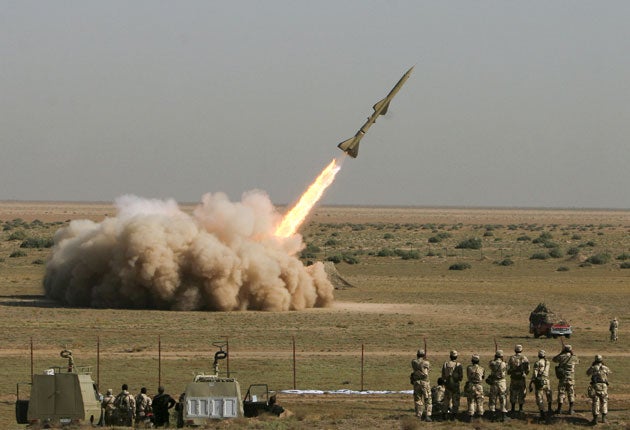Your support helps us to tell the story
From reproductive rights to climate change to Big Tech, The Independent is on the ground when the story is developing. Whether it's investigating the financials of Elon Musk's pro-Trump PAC or producing our latest documentary, 'The A Word', which shines a light on the American women fighting for reproductive rights, we know how important it is to parse out the facts from the messaging.
At such a critical moment in US history, we need reporters on the ground. Your donation allows us to keep sending journalists to speak to both sides of the story.
The Independent is trusted by Americans across the entire political spectrum. And unlike many other quality news outlets, we choose not to lock Americans out of our reporting and analysis with paywalls. We believe quality journalism should be available to everyone, paid for by those who can afford it.
Your support makes all the difference.Iran said it successfully test-fired the longest-range missiles in its arsenal today, weapons capable of carrying a warhead and striking Israel, U.S. military bases in the Middle East, and parts of Europe.
State television said the powerful Revolutionary Guard, which controls Iran's missile programme, successfully tested the medium-range Shahab-3 and Sajjil solid-fuel missiles with ranges up to about 1,200 miles. It was the third round of missile tests in two days of drills by the Guard.
The war games come at a time when Iran is under intense international pressure to fully disclose its nuclear activities. They began Sunday, two days after the US and its allies disclosed that Iran had been secretly developing an underground uranium enrichment facility and warned the country it must open the site to international inspection or face harsher international sanctions.
General Hossein Salami, head of the Revolutionary Guard Air Force, said Sunday the drills were meant to show Tehran is prepared to crush any military threat from another country.
The revelation of Iran's secret nuclear site has given greater urgency to a key meeting on Thursday in Geneva between Iran and six major powers trying to stop its suspected nuclear weapons programme.
Alex Vatanka, a senior Middle East analyst at IHS Jane's, said Tehran was conducting missile tests now "to show some muscle, show some strength, and say the game is not over for Iran yet." He noted the upcoming meeting in Geneva.
"They felt going into these meetings ... that they needed to have something else to bolster their position, and I think that Iran's Revolutionary Guard showing a bit of military muscle here is part of that," he said.
US Secretary of State Hillary Clinton said she doesn't believe Iran can convince the US and other world powers at the upcoming meeting that its nuclear program is for peaceful purposes, as Tehran has long claimed. That puts Tehran on a course for tougher economic penalties beyond the current "leaky sanctions," she said.
The nuclear site was revealed in the arid mountains near the holy city of Qom and is believed to be inside a heavily guarded, underground facility belonging to the Revolutionary Guard, according to a document sent by President Barack Obama's administration to politicians.
After the strong condemnations from the US and its allies, Iran said Saturday it will allow UN nuclear inspectors to examine the site.
Israel has trumpeted the latest discoveries as proof of its long-held assertion that Iran is seeking nuclear weapons.
State media reported tests overnight of the medium-range Shahab-1 and Shahab-2 missiles. That followed tests early Sunday of the Shahab-1 and Shahab-2, with ranges of about 185 miles and 435 miles respectively.
Iran's last known missile tests were in May when it fired its longest-range solid-fuel missile, Sajjil-2. Tehran said the two-stage surface-to-surface missile has a range of about 1,200 miles - capable of striking Israel, US Mideast bases and southeastern Europe.

Join our commenting forum
Join thought-provoking conversations, follow other Independent readers and see their replies
Comments